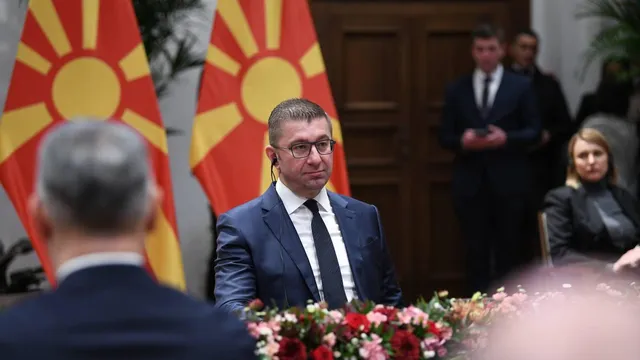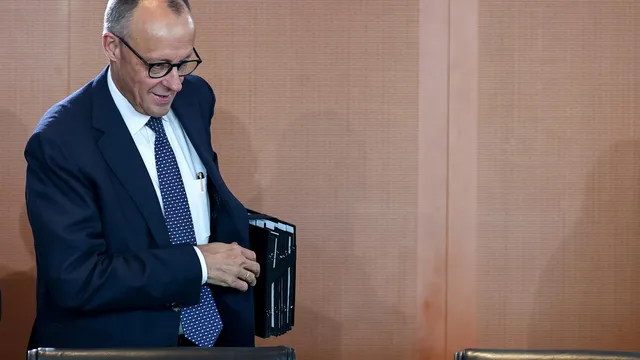The regime of Hristijan Mickoski is rapidly — in both speed and policy — distancing the Republic of North Macedonia from the European Union, the only guarantor of its survival outside the framework of the Yugoslav template and the tight grip of Belgrade.
If, in the cold January of 1992, Bulgaria became an unconditional guarantor for an independent Macedonia, in the current month of August the authorities in Skopje are waging an inept campaign to cover up their assault on the EU Negotiating Framework, the Treaty of Friendship, Good Neighbourliness and Cooperation with Bulgaria from 2017, as well as its two protocols — in this case, specifically the second one, signed in 2022.
Nonetheless, regardless of the year or the season, North Macedonia does not function as an independent state that should be constantly working for a better future.
Mickoski attempted to conceal the path along which he is not merely walking but skipping, with the energetic help of former MP Liljana Popovska — once an ally of his political father Nikola Gruevski.
It was Popovska who launched an initiative to challenge the protocol from the second session of the Joint Intergovernmental Conference, signed by the foreign ministers of Bulgaria and North Macedonia three years ago, during the period when the so-called “French proposal” was agreed upon. It took only a few days for the Constitutional Court of North Macedonia to open proceedings to examine the complaint. The lightning-fast reaction undoubtedly proved that behind the arguments of the “ordinary citizen” stood the political elite. Even “Macedonian” media outlets financed by Viktor Orbán’s regime — which has sheltered Gruevski — have failed in their attempts to conceal the true goal of this decision.
Liljana Popovska claims the document is in contradiction with the Constitution, specifically with the fundamental freedoms and human rights. She argues that the protocol has an inappropriate form and content, that it goes beyond the scope of a legal act regulating a single article of an agreement between two states, and that it produces harmful consequences for the identity issues of the “Macedonian people, language, and state.” Popovska further maintains that the protocol is unconstitutional because it was not ratified by parliament, was not published in the “Official Gazette,” and is in conflict with the Law on the Conclusion, Ratification, and Implementation of International Treaties. What the former MP wants from the Constitutional Court is for the protocol to be annulled.
In fact, the document stipulates that Skopje agrees that the next intergovernmental conference with the EU will take place only after it includes Bulgarians among the constituent peoples in the preamble and two articles of its Constitution. In the same protocol, the government of the Republic of North Macedonia confirms its commitment that nothing in its Constitution can or should be interpreted as grounds for interfering in Bulgaria’s internal affairs with the aim of protecting the status and rights of persons who are not citizens of North Macedonia. This clause de facto and de jure means that Skopje will not claim the recognition of a “Macedonian minority” in Bulgaria.
The protocol also provides for countering hate speech against Bulgarians and Bulgaria — which enjoys massive institutional and media support — rehabilitating the victims of the communist regime in Macedonia, and opening the archives of the Yugoslav secret services. All of these are substantial conditions that are being forgotten on both sides of the border while Mickoski frightens his fellow citizens with claims that Brussels will steal their “centuries-old identity.” Unfortunately for him, the Negotiating Framework obliges the European Commission to monitor compliance with these conditions and to inform the EU Council.
The attempt to revise international agreements has met with a categorical “no” from European Commission President Ursula von der Leyen and European Council President António Costa, who recently stressed in Mickoski’s company: “There is no Plan B; North Macedonia must implement what was agreed in 2022; there is nothing to negotiate.”
Costa seems to have been misled into thinking that for Mickoski, Plan A means EU integration. The real goal is becoming clearer and more transparent, as evidenced by the statement from Foreign Minister Timcho Mutsunski:
“The initiative to assess the constitutionality and legality of the protocol before the Constitutional Court will confirm whether the constitutional changes are the only obstacle for Bulgaria to unblock our EU integration process,”
he said — conveniently omitting the real problems of his country, described in detail in the European Parliament’s report: Belgrade’s dangerous “Serbian World” project, the destructive influence of Russia and China, foreign control over the media, and strategic corruption in the country, alongside the problematic loan of hundreds of millions of euros (yuan) from Hungary.
Here is Mickoski’s Plan A in a single sentence...
The Bulgarian state is obliged to respond to this unprecedented violation of international law by Skopje, which bears all the hallmarks of the first step towards potentially undoing all progress since 2017. Skopje’s attempt to present Bulgaria and the international community with a fait accompli — that the existing agreements are inapplicable under the Constitution and therefore must be revised — must meet with categorical opposition from both Bulgaria and the European Union.
The “Mickoski” project erases the chance for EU integration, propels Skopje into the alliance of authoritarian regimes in Europe, disheartens the citizens of North Macedonia, and conveniently channels their anger toward their “eastern neighbor.” Neither parliamentary speeches nor empty declarations from the podium will suffice. It is high time that “informing partners” is replaced by a clear and categorical rationale from Bulgaria to its allies. | BGNES
---
Dimitar Ruskov, Head of the International News Department at BGNES

 Breaking news
Breaking news
 Europe
Europe
 Bulgaria
Bulgaria







